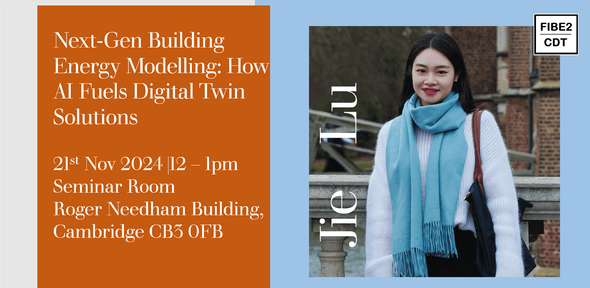FIBE2 Lunchtime Seminar is excited to welcome Jie Lu, our first speaker, on 21st November. Lunchtime Seminar for the academic year will be organised by Cohort 5 and this seminar is arranged and hosted by Monty Jackson.
Title: Next-Gen Building Energy Modeling: How AI Fuels Digital Twin Solutions
Speaker Bio:
Jie Lu is a visiting Ph.D. student in the Energy Efficient Cities Initiative (EECi), at the University of Cambridge's Department of Engineering. Her background is in Heating and Ventilation, with a bachelor's degree from Nanjing Normal University (NNU), and a master's degree from Zhejiang University (ZJU). She is currently a PhD candidate in Power Engineering and Engineering Thermophysics at ZJU, China, with a research focus on the modelling of digital twins in building energy systems.
Jie’s primary work includes developing effective and efficient hybrid modelling methods, such as novel approaches for first-principle models and machine learning techniques for load estimation. Additionally, she focuses on retrofitting green buildings to enhance their operational flexibility. Her research contributes to advancing sustainable and resilient building practices, integrating technical innovation with a strong emphasis on energy efficiency in urban environments.
Abstract:
This presentation explores the transformative potential of advanced AI technologies—such as large language models (LLMs), graph neural networks (GNNs), and variational autoencoders (VAEs)—in digital twin modelling for building energy systems. With LLMs serving as the “intelligence” behind our models, we streamline automated building simulations from geometry extraction to parameter calibration. Yet, challenges like incomplete data, design load uncertainties, and the need for scalable data-driven solutions remain. To address these, we integrate GNNs to handle load estimation uncertainties and VAEs to impute missing parameters. This layered approach empowers the LLM-driven digital twin to more accurately replicate and optimise complex building environments, setting the stage for smarter, more sustainable energy systems.


